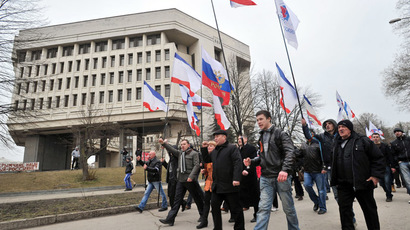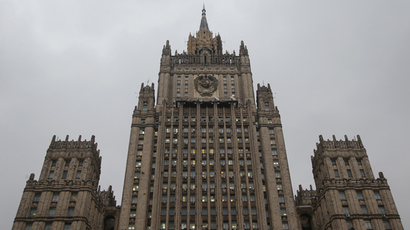Putin signs order to recognize Crimea as a sovereign independent state
President Vladimir Putin has signed an order that Russia recognizes Crimea as a sovereign and independent state. The Autonomous Republic of Crimea held a referendum on Sunday with over 96% voting for integration into Russia.
“According to the will of the peoples of the Crimea on the all-Crimean referendum held on March 16, 2014, [I order] to recognize the Republic of Crimea, in which the city of Sevastopol has a special status, as a sovereign and independent state,” the document reads.
The order comes into force immediately.
Crimea was declared an independent sovereign state, the Republic of Crimea, on Monday, the autonomous Ukrainian regional parliament's website stated.
Crimea also addressed the UN seeking recognition as a sovereign state.
"The Republic of Crimea intends to build its relations with other states on the basis of equality, peace, mutual neighborly cooperation, and other generally agreed principles of political, economic and cultural cooperation between states," the parliament said.
The Crimean parliament also unanimously voted to integrate the region into Russia.
The parliament's resolution comes after Sunday's referendum which resulted in over 96 percent of voters answering ‘yes’ to the autonomous republic joining Russia. The overall voter turnout in the referendum was 81.37%, according to the head of the Crimean parliament’s commission on the referendum, Mikhail Malyshev.
He also stressed that there were no complaints concerning the voting process. Those international observers who came to Crimea made an official statement on Monday that the vote was free and conformed to international standards.
"The documents on the referendum fully reflect international standards, including the secret ballot, open and transparent nature of the referendum, public and international observation. These acts have no discriminatory restrictions" said Mateusz Piskorski, former Polish MP who participated in the observation of the referendum. "There was freedom of speech and expression," he added.
Deputy Chairman of the Parliament of Serbia Nenad Popovic stressed that during the plebiscite, equality of rights of referendum participants was consistently provided.
"The participants of the referendum were provided the opportunity to review the wording of questions in the languages of the main ethnic communities of the Republic of Crimea", he said.
The international reaction to the Crimea’s referendum and its resolution was the implementation of sanctions. On Monday the EU and US slapped visa bans and financial restrictions against Russian and Ukrainian officials.
The White House stated that "the actions and policies" of the Russian government with respect to Ukraine "undermine democratic processes” and “threaten its peace,” sanctioning 11 officials. While the EU late on Monday introduced a list of 21 Russian and Crimean political figures that will be sanctioned for 6 months.
The decision to hold a referendum was sparked by the bloody Maidan protests that resulted in the ousting of President Viktor Yanukovich. Crimea refused to recognize the coup-imposed government. The people in the region also feared that the far-right Kiev authorities would not represent their interests. The Crimeans, the majority of which are ethnic Russians were particularly unhappy over parliament's decision to revoke the law allowing using minority languages, including Russian.














